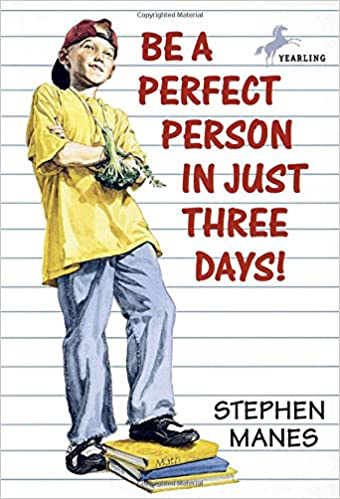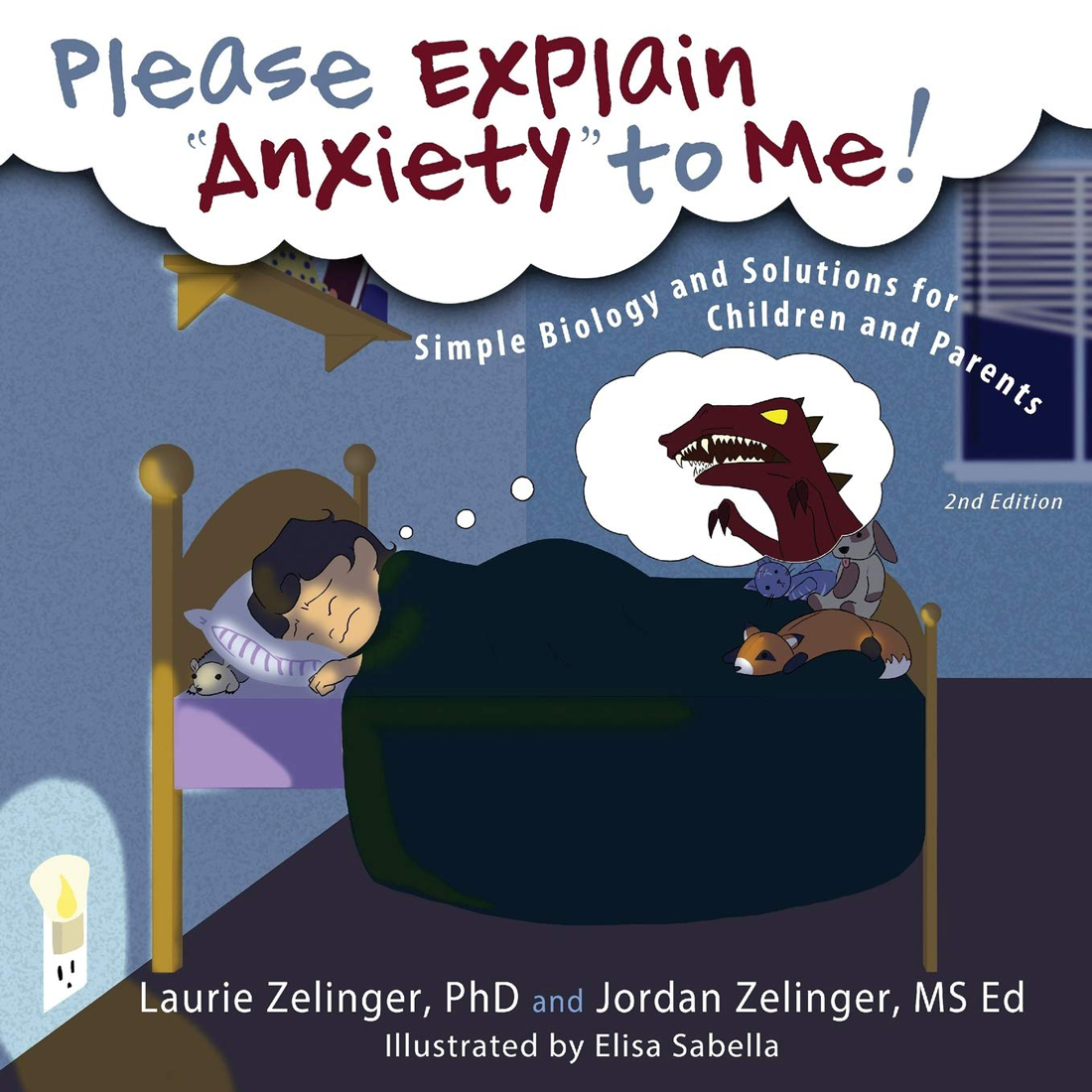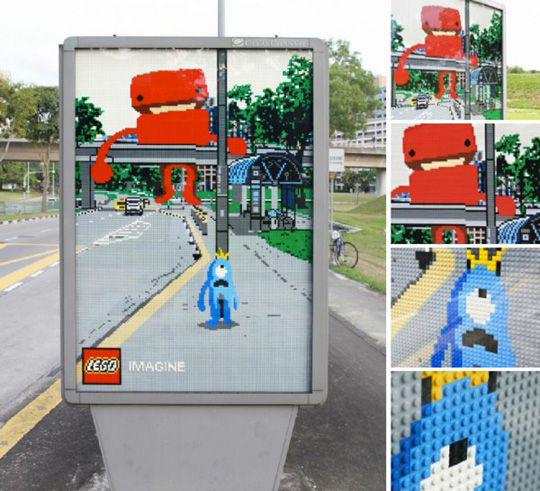If my marketing isn’t perfect, bad things are gonna happen…
If my marketing isn’t perfect, bad things are gonna happen…
You, like I, might have felt this way at one time or another. I get you.
I want to start talking about authenticity versus perfectionism with a quick story about a friend of mine.
At the tender age of eight years old (in 1987), somehow, somewhere, she thought that being perfect would fix all her problems (sound familiar?).
So began her quest for perfection.
Since she was a bookworm, the library (that pre-Google place with all the books, remember?) was her second home and subsequently, where she got all her information. So, that was the first place she went to find the answer.
And did she ever…Here’s an image of the gem she found below.

Of course, she was elated (it took only three days? Don’t gasp. That would be about 5 minutes in today’s world). Then, she got home and read it…(okay, I feel the need to reiterate that this is a children’s book). Obviously, there was a moral in this book about how to be perfect.
It was this: NOBODY’S PERFECT.
Mind blowing, I know, yet for her at eight years old, it was a revelation (less life experience, right?). Despite this really great moral lesson, she felt duped.
Where were all the skills and tactics that she was looking for? In fact, she told me that she was like, “Great, now I have to find someone else who’s got a real answer. This book is for kids.”
Alright, she’s got a big personality too, but really why would someone who knows she’s being duped, and at a very young age, still want to be perfect?
How come she didn’t see through the superficial veneer and performance of perfection?
It might have to do with living in an increasingly complex world and needing more answers on how to cope and deal with the utter unpredictability and insanity that makes up about 95% of being human.
As we talked about perfectionism and marveled at her specific quest to find it as a girl, we pondered what might have driven her to such an extreme solution.
“Looking back,” she said, “This was probably the book I needed.” (How many of you feel the same way? I’m raising my hand here too.)

(Remember this was 1987, my friends, these kinds of books were not yet mainstream. Though it’s awesome they are now.)
As we dove further into her tendency to rely on perfectionism to solve problems (and the underlying anxiety that was probably fueling it), I felt compelled to address this when working with my clients.
Though they may not have “diagnosable” anxiety* that needs medical intervention, they definitely do have ongoing anxieties that feel like the image below:

The anxieties typically include the usual suspects.
What if I make a mistake? Look incompetent?, Loose a bunch of money? Lose respect? Lose my family, my friends, the love of my life? My f***ing pants??? (By the time we get to their fear about losing their pants, I have them breathe into a bag and watch this Woody Allen clip on aliens who also need pants while reassuring them I’ll help them find a new pair with or without an alien invasion.)
How can I help my B2B clients quell their anxieties while also demonstrating that perfectionism just makes it worse?
As I continued to mull over how to better guide my clients to the other side of perfectionism (across alligator-infested waters, of course), I wracked my brain for accessible antidotes. I was after tips and tricks that actually help keep them afloat, motivated and connected…I’ll come back to this soon.
But first, I want to delve into a clear definition of what perfectionism is and why it’s so damaging.
Perfectionism is basically the toxic combination of “excessively high personal standards and overly critical self-evaluations.” It’s these two things that rob us of our humanity aka our ability to relax, feel, connect, create and express who we are. Sounds awful right? That’s because it is.
Typically, my clients’ descent into the pernicious cycle of perfectionism looks like this (aka a series of questions that take place in the span of five minutes):
- “Should I do online or offline marketing?”
- “Does my business need a blog, a vlog, a live person handing out free glow-in-the-dark legos?”
- “Maybe I should do a direct mail newsletter, an email newsletter, texts?
- Maybe digital ads? SEO? Morse Code? Smoke signals?”
- Maybe I should just do everything while clapping my hands and jumping up and down????
Then, as if their work output expectations hadn’t been increased enough, they blow it up with the inevitable conclusion that…
“Whatever I do, it has to be perfect (because there’s a lot of money, time, pressure, my career, my happiness riding on this)!”
It makes sense why this happens, my clients are typically the owners and/or heads of IT companies looking to grow bigger, better, faster and cheaper without making any mistakes.
Sounds like excessively high personal standards, doesn’t it?
Then, they berate themselves (and sometimes their staff) when it doesn’t work out that way.
The result?
They dig in deeper, micromanage, get moodier, fiercer, angrier, more and more desperate…till they think they’re an Aladdin when really they’re just channeling their inner Jafar.

As I wracked my brain for some tactics to help quell the tendency towards perfectionism, a few methods stood out, including mindfulness, self-compassion, yoga, and Qigong.
Though these practices provide scientifically proven, positive benefits, the downside is that they don’t emerge unless practiced consistently over the long haul. (Despite this, I still highly recommend them.)
And again, my clients are very busy people, they need anxiety calming strategies that will work in a pinch.
There is one fast acting antidote to the doom and damn of perfectionism: take a depth breath and accept you’re human. (Don’t I make it sound so easy? Please don’t punch me. This will be so worth it, I swear.)
The major thoroughfare to admitting your humanity is to actively embrace your authenticity (aka being real), which is something that even Brene Brown herself, the shame and vulnerability researcher, has dedicated her life and work to. Spoiler alert: authenticity depends on vulnerability (and empathy and thoughtfulness and respect). Here’s Brene Brown’s definition of authenticity, (which is one of my favorites):
“Authenticity is the daily practice of letting go of who we think
we’re supposed to be and embracing who we are.”
“Hey! I thought this was a B2B marketing education email that was going to show me how to blast through my perfectionism and be better at marketing my company/products/services! Why are you talking about authenticity and vulnerability?” (Seriously, this is super ngross/annoying/boring/zzzzzzz…)
I get you, though, to be perfectly honest, in my 20+ years in sales and marketing, I’ve seen time and time again how authenticity directly leads to more successful marketing and increased growth and sales.
Not only do companies grow better because of it, but their employees will grow happier because of it.
Not only will you be modeling a healthier, saner leadership, BUT you’ll feel healthier and saner as a result. Bye, bye Jafar and hello Aladdin (I’ll take that magic carpet too)…
Obviously, sales and marketing aren’t just an internal thing (no belly button gazing here, my friends), it’s also about your very external clients. But making these changes internally will lead to external results! Here’s why:
Your clients are savvy. They can tell when you’re being real and when you’re not. In fact, according to Forbes, “Eighty-six percent of people say authenticity matters when deciding what brands they like and support.”
Even if you’re a B2B business, your B2C clients’ clients know how to use the internet to suss you out. AND how to use their voices to influence your B2C clients if they don’t like/believe/connect with what they read and see about you.
Being real matters and will payoffs.
If you’re still not convinced that authenticity (vs perfection) will lead to more B2B sales, read further to learn how:
1. Authenticity makes you stand out.
Being authentic is not our default setting. Thank you, social media. How many more images of the perfect events/gatherings/activities/accomplishments of others can you handle looking at? (I’m not even being cynical here.) It’s super distorting.
Take for example my daily routine – I woke up, exercised, showered, ate breakfast, got in my car and went to work. What human doesn’t do some version of this basic routine? Apparently, not many, if you base your opinion of what constitutes a normal life based on what you see on social media.
This is how my life could look on Instagram. I’m commuting by private jet to Jamaica to meet my new billion dollar client specializing in Jamaican biodynamic coffee while jamming out with the hired musical talent, the Black Eyed Peas (who are also on this jet). Obviously, I play electric guitar and Fergie’s rejoined the band. We’re all wearing matching Armani suits, rolodexes (though mine glows in the dark) for the coffee’s new marketing campaign that includes us all jumping out of the jet for a killer skydive landing in their organic bamboo building headquarters with parachutes made out of 100 dollar bills.
Apparently, Instagram’s filters have gotten pretty strong these days.
It’s hard to not be influenced after being exposed to all these messages 24/7, ad infinitum. Even though I work in marketing, it still gets to me sometimes, so you’re definitely not alone.
And here’s the irony, even if we all get caught up in the trappings of the perfectly painted fluff that masquerades as real life on social media these days, more and more people are growing increasingly numb and unimpressed by it.
It’s easy to see how much the social media channel determines how and which side of ourselves we present to the world.
So, getting back to your buyers, it’s essential to engage them differently online by being authentic and real because this will actually make you stand out (unless you’re Mark Ruffalo and then you can just post all the photos you want of you and your famous friends).
You might be thinking, “If this is true, then why do some businesses still believe that consumers want perfectly edited, perfectly produced, and perfectly fake marketing content?”
Because they’re still living like they’re Marty McFly in Back to the Future.
As charming and fun as time travel was in the 80’s, it’s still the wrong ass decade…
It’s at this point that most of my clients are penciling in, “be more authentic,” into their calendars and placing it as a task on their to-do lists. But really, what does this mean?
This is the time when I send them examples of companies modeling authenticity.
Here’s a brand that’s doing this well and proof that sales go up!
Canadian company, Goodlife Fitness, decided it was time to transform the story behind working out at the gym reframing it as living the good life rather than another exercise in attaining bodily perfection.
To this end, they launched their “Live Your Good Life” campaign, featuring ads turning everyday people into fitness heroes for themselves and their loved ones. They’re building trust with their clients by creating a judgement free culture around working out. Brilliant, right?
2. Authenticity makes you relatable.
Let’s revisit the book, How to Be Perfect In Three Days, that appeared at the beginning of this blog. The book is ultimately right: NOBODY’S PERFECT.
So, let’s all stop collectively pretending it’s possible (preferably at the same time). And to be real, perfect people annoy me because I have no freaking idea how to connect with them!
For example, have you ever run into a person, while running errands, who asks how you are and you’re like, “Oh you know, ho hum, la la la, it’s Tuesday, I destroyed my pants trying to fix my electric hedge clippers, which decided to eat them on my front lawn in front of the neighbors. But hey, I survived and get to live another day to hunt down more pants and buy a new pair of hedge clippers.”
Then, because you’re a polite, kind person, you ask them how they’re doing.
There response goes something like this, “Oh my life is perfect. Not only is my business making me tons of money and I have clients around the world but I fixed my own anxiety. I’ve magically erased all my wrinkles and I’m basically going to live forever.”
After you remember to hide your gaping mouth hole, how in the f***ing hell do you respond?
I’m not saying that we can only relate to people via problems or negativity or crappy weather (NoDak folks, I’m looking at you here) but rather through being real.
Maybe that person is being real? But then, why do I or you feel so unseen, unheard and essentially, invisible? Basically, what I’m pointing out here is that the performance of perfection is tone-deaf.
AGAIN, most of your clients have been on this planet for some time. They no longer expect perfect (even the younger consumers think it’s lame). What most people are craving for is what’s real (and probably some souped up awesome burrito.)
At the end of the day, please remember to be relatable, e.g. balanced. For sure, have your great days, just don’t forget to see and acknowledge when others aren’t.
So, what company is killing it at being relatable? Dove. Yep, the soap company. They launched a “Real Beauty” campaign, which has since developed into the “Dove Real Beauty Pledge” and the “Dove Self-Esteem Project.”
They saw how the effects of the noxious modeling industry, plus its toxic definitions of ideal beauty, were impacting everyday women AND they spoke to it.
Why was this such a successful marketing tactic? Because it validated regular women and stated that beauty is diverse, that ultimately, NO ONE owns the copyright on what beauty is.
Women felt heard, seen and valued in these advertising campaigns. Dove had become relatable.
3. Authenticity makes you trustworthy.
This is true without a doubt. Authenticity not only makes you stand out in a crowd and more relatable, it also makes you trustworthy.
Listen, don’t we all just want to buy cars (and everything else for that matter) from those we trust who aren’t going to screw us?
That’s how consumers feel all the time. Most, if not all, clients just want some good old-fashioned honesty.
A beautiful example of building client trust through “seeing” and “hearing” their clients is Domino Pizza. Back around 2011, clients started getting very vocal about Domino’s “cardboard pizza and ketchup sauce.”
They said it sucked and that they’d rather eat microwave pizza instead. WOAH. Pretty bad, right?
So, Patrick Doyle, the Domino’s Pizza CEO at the time, decided to try the pizza himself, which he hadn’t tried in a few years (obviously they need to check their quality control methods).
Ultimately, he agreed with the haters that Domino’s pizza left much to be desired. He promised to deliver a better pizza and now, Domino’s is leaving Google stock returns in the dust.
Authenticity is not only the way to invest in building trust among your intended audience, it also helps free you from the toxic distortion of perfectionism.
In the end, be real, be relatable, be trustworthy and you’ll reap multiple benefits.
*Lastly, let me take a moment to give a short PSA (since I’m an avid believer in everything health related, including the physical, the mental and the emotional).
Perfectionism can be a Catch-22 – it can have a detrimental effect on your physical and mental health and/or it could (in the presence of other symptoms) be a sign of an underlying or unaddressed mental health issue. There is no shame in this. We all have different brains, (which is truly a beautiful thing). SO, if you’re having a hard time letting go of perfectionism and it’s negatively disrupting your life and relationships, be sure to check in with your health professional(s). We all have these types of problems and some of us may need more or different resources. This is normal and completely ok. You deserve to be healthy, happy and free.
Now that it’s clear that being authentic makes it way easier to connect with your clients and vice versa (plus it’s less stressful on you), it’s time to talk about how to get your products and services in front of the right fit clients whose problems you’re uniquely equipped at solving. Stay tuned…
Got Marketing Questions? We can help.
By clicking this button, you submit your information to Scott Growth Strategies, who may use it to communicate with you regarding this and other services.
